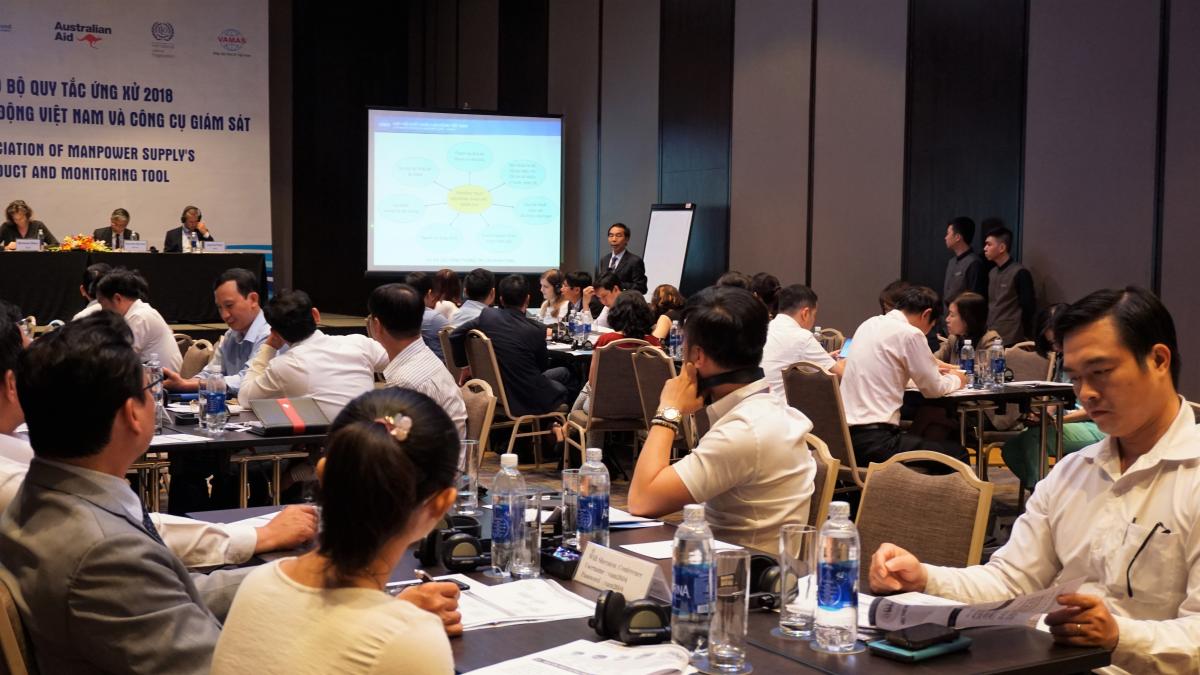Review workshop on 2018-2019 Monitoring and Evaluation of the VAMAS Code of Conduct
Cập nhật: 14/01/2020 01:50


Opening speech
by Ms. Valentina Barcucci, Labour Economist, ILO Country Office for Viet Nam
Event: Review workshop on 2018-2019 Monitoring and Evaluation of the VAMAS Code of Conduct
Organizer: Vietnam Association of Manpower and Supply
Date: 8 February 2020
Time: Time of registration: 8:00-8:30
Time of opening: 8:30-9:00
Venue: 924 Bach Dang, Thanh Luong Ha Noi (LOD recruitment agency)
- Dr. Nguyen Luong Trao, President, VAMAS
- Mr. Nguyen Gia Liem, Ministry of Labour, Invalids and Social Affairs
- Representatives from VGCL, MoLISA, mass media, recruitment agencies
Ladies and Gentlemen
It is my pleasure today, on behalf of the International Labour Organization to attend the Review Workshop on 2018-2019 Monitoring and Evaluation of the VAMAS Code of Conduct. My congratulations to the VAMAS officials who have led the assessment of the implementation of the Code of Conduct, and further congratulations to the recruitment agencies who have participated in the assessment. You are leading the future of recruitment in this country, and we are grateful for your efforts and your openness to continual improvement of recruitment practices.
The ILO has been a long-term partner with the Vietnamese Association of Manpower and Supply (VAMAS) and recruitment agencies in Vietnam. Together we have been working to provide quality services and contribute to better conditions for Vietnamese workers who seek overseas employment through implementation of the VAMAS Code of Conduct. Today, we are happy to see this ongoing commitment and progress made by VAMAS and more than one hundred recruitment agencies participating in the monitoring and evaluation of the Code of Conduct revised in 2018.
The adoption of the updated Code of the Conduct 2018 was a significant step in demonstrating the willingness of recruitment agencies to continually improve practices. The updated Code was well received by an industry that recognises that improving self-regulation and raising standards in recruitment will better protect migrant workers from exploitation, including trafficking and forced labour. The new standards in the 2018 Code aim to reduce fees charged to migrant workers and reduce the vulnerability of migrant workers to debt bondage, ensure non-discrimination, address gender issues, and increases protections available to domestic workers.
The Code of Conduct Viet Nam 2018 represents an important, business-led complement to government regulation of recruitment agencies – and moves beyond the minimum standards set by government to ensure positive business practices that reflect rights-based approaches to recruitment. In this, we see business leading the shift to more responsible recruitment practices that are demanded by employers in destination countries.
Today Vietnamese migrant workers have more and better quality employment options abroad than before. Business knows, better than just about anyone, that moving towards a ‘zero fee’ to migrant workers model is important for recruitment agencies to survive in the international market. Countries of final destination for goods made by migrant workers are increasingly requiring ‘zero fee’ models within their supply chains, and to remain competitive, Viet Nam must be able to offer migrant workers recruited without charges incurred by these workers. In recent years, Australia, the UK and France have adopted ‘modern slavery’ laws that consider the complete supply chain of goods entering these countries. In response, numerous companies have adopted a minimum standard that no worker should pay for a job in their supply chains. We also know well that abuses involving debt bondage linked to repayment of recruitment fees can amount to human trafficking and forced labour. These are not only serious violations of human rights and workers’ fundamental rights, but also major risks for business.
We acknowledge your efforts, with support from VAMAS, to develop policy documents, to have Standard Operation Procedures in place, to conduct capacity building training for staff, and closely monitor and evaluate changes made to be compliant with the standards within agencies to reduce the risk of business to forced labour and human trafficking. The ILO is proud to support this important undertaking through our labour migration programme.
However, to guard against some of the risks inherent in labour migration, recruitment practices must be fair and ethical and the regulation of recruitment agencies must be strict. Only when a level playing field is created – where all recruitment agencies are held to the same standards, and all migrant workers protected by standards set by government – will the recruitment industry in Vietnam thrive and Viet Nam will be able to make the most out of migration.
The revision of the Law 72 is an opportunity to ensure international standards are realised in Vietnamese recruitment industry, and to move towards to a ‘zero fee’ model. This would ensure that Vietnamese migrant workers will be in demand by companies across the world for years to come. The ILO stands ready to provide technical assistance in this shift in the legislative framework.
On behalf of ILO, I would like to take this opportunity to again congratulate VAMAS, recruitment agencies and partners for their achievements.
Thank you all for allowing me to be a part of today and I wish you the best.